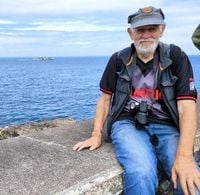On Wednesday, September 3, 2025, tragedy struck Lisbon as the city’s beloved Glória funicular derailed and crashed into a building, claiming the lives of 16 people and injuring nearly two dozen more. Among the victims was Andrew David Kenneth Young, an 82-year-old British man known to his friends and family simply as Dave. His death, along with those of fellow Britons Kayleigh Gillian Smith, 36, and William Nelson, 44, sent shockwaves through communities in the United Kingdom and beyond, uniting people in grief and remembrance.
According to police statements reported by BBC and other outlets, Young was a lifelong transport enthusiast who spent his retirement traveling the world to visit heritage railways and tramways. Born and raised in Auchterarder, Perthshire, he moved to Holyhead on Anglesey in 1980, where he enjoyed a long career as a customs officer before dedicating his later years to his passion for transport. In a statement released by his family and shared by North Wales Police, they reflected, “It is a comfort to his sons, their mother, and his brothers that his final moments were in pursuit of the hobby which gave him so much happiness.”
Young’s family, requesting privacy during this difficult time, described him as a man whose curiosity and joy for the world’s railways brought happiness not only to himself but also to those around him. “A lifelong transport enthusiast, in retirement he enjoyed visiting heritage railways and tramways around the world,” the statement read. For his loved ones, there is solace in knowing that he was doing what he loved up until the very end.
The two other British victims, Kayleigh Smith and William Nelson, were a couple from Cheshire who had just begun their holiday in Lisbon. Smith, a theatre director, and Nelson, a lecturer at Manchester’s Arden School of Theatre, were remembered by colleagues at MADS Theatre in Macclesfield for their “considerable contributions both to MADS and to drama in the North West.” Their sudden deaths have left a deep void in the local arts community, with tributes pouring in from friends, students, and fellow theatre professionals.
In total, the crash claimed the lives of five Portuguese nationals, three Britons, two Canadians, two South Koreans, an American, a French citizen, a Swiss citizen, and a Ukrainian, according to Portuguese police. The diversity of the victims underscores the Glória funicular’s status as one of Lisbon’s most popular tourist attractions, drawing visitors from across the globe to experience its iconic yellow carriages and steep, scenic route between Restauradores Square and the Bairro Alto district.
The Glória funicular, built in 1885 and now 140 years old, is an electrified railway system that uses steel cables to transport passengers up and down Lisbon’s famously steep hills. On the day of the accident, the funicular was packed with passengers—many likely eager tourists—when disaster struck. A preliminary investigation found that a cable linking the two carriages snapped, causing one of the carriages to derail and crash into a building at a bend in the road. Despite the brakeman’s attempt to apply emergency brakes, the derailment could not be prevented.
Officials have stressed that while the snapped cable is a significant finding, the full cause of the crash remains unknown. Investigators have not reached “valid conclusions” and are expected to provide a comprehensive report within 45 days, according to statements cited by The Independent. The rest of the funicular’s mechanism was reportedly functioning properly at the time, making the incident all the more perplexing for authorities and the public alike.
Prime Minister Sir Keir Starmer expressed his deep sadness at the loss of British lives, extending his condolences to the families of the victims and solidarity to the people of Portugal. “His thoughts are with their families and those affected by this terrible incident,” a Downing Street spokesperson said. “We stand united with Portugal during this difficult time.” The Foreign, Commonwealth and Development Office has confirmed it is supporting the families of the British victims and is in contact with local authorities as investigations continue.
Llinos Medi, Member of Parliament for Ynys Môn, also offered condolences to Mr. Young’s family and “to those who have been affected.” Such gestures of sympathy have rippled through communities in Scotland, Wales, and England, as well as among the international visitors who shared in the tragedy.
For many, the crash is a stark reminder of the enduring risks associated with aging infrastructure, even when systems are maintained and cherished as part of a city’s cultural heritage. Lisbon’s funiculars—the Glória, Lavra, Bica, and Graça—are not only practical modes of transportation but also living monuments to the city’s history and charm. Their bright yellow carriages, creaking up and down the hills, have long been a symbol of Lisbon’s vibrancy and resilience.
Now, as the city mourns, questions linger about the safety of these beloved railways and what steps can be taken to prevent such tragedies in the future. Local authorities have pledged a thorough investigation, while tourists and residents alike wait anxiously for answers. In the meantime, the outpouring of grief and solidarity from around the world is a testament to the far-reaching impact of the disaster.
As the investigation unfolds, the lives and passions of those lost—like Andrew David Kenneth Young, whose devotion to transport spanned continents and decades—serve as a poignant reminder of the human stories behind the headlines. For their families, friends, and communities, the pain is profound, but so too is the pride in lives lived with curiosity, generosity, and joy.
The coming weeks will bring further details about the cause of the crash and, perhaps, measures to ensure the safety of Lisbon’s historic funiculars. For now, the world remembers those who perished and stands with those who mourn, united by a shared sense of loss and the hope that such a tragedy will never be repeated.



